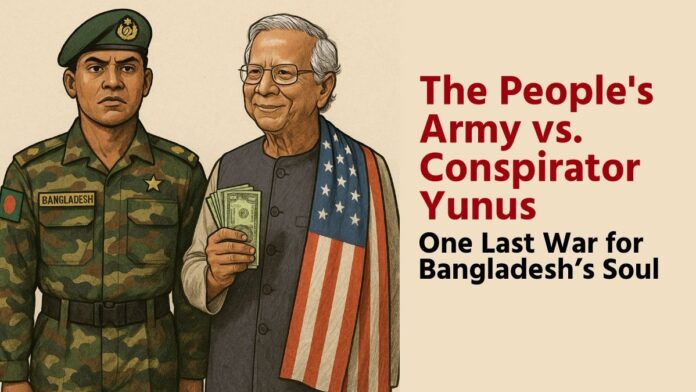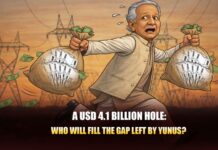The history of Bangladesh has been forged through conspiracies and resistance. Yet in every crisis, one force has stood unwavering—the unity of the people and the trust they place in the Bangladesh Armed Forces. This army has never been a puppet of politics; rather, it has stood as a shield when the nation’s very existence has come under threat.
Today, that very institution is under attack.
But the enemy isn’t across the border—it’s within.
And its name is familiar: Dr. Muhammad Yunus.
Once celebrated for his concepts of “social business” and “poverty alleviation,” the mask has now fallen. Dr. Yunus is no longer just a microcredit pioneer; he has emerged as a calculated conspirator carrying a deeply subversive agenda. His mission: to weaken Bangladesh from within, methodically and meticulously.
While projecting himself internationally as a symbol of compassion, his actions at home tell a different story. He has sought to build a parallel power structure—one that disregards national laws, the judiciary, democratic institutions, and even the Constitution. Every time the legal system takes a step toward justice, letters flood in from abroad. When his fraudulent development narrative is challenged by the people, global institutions and Nobel laureates rise to defend him.
But the question is: Why should international pressure follow when a citizen faces lawful scrutiny?
Why is that pressure directed at the military?
Because the Bangladesh Army remains the final line of defense between the people and betrayal.
If the army stands by its principles and supports the people, Yunus’ designs will fail.
Thus, the goal is to confuse, isolate, or discredit the military—to push them away from the people, or plunge the political balance into chaos.
To that end, multiple strategies are being deployed:
Pressure via UN peacekeeping missions
Foreign interference in internal affairs
Coordinated propaganda campaigns
All with one objective: to corner and discredit the military.
Dr. Yunus knows well—the people’s last trust lies in their army. He seeks to erode that trust, to turn citizens against their own protectors. By discrediting the military, he aims to weaken the state, facilitate foreign intervention, and shield himself from legal accountability. This is not a fight for justice—it is a shameless attempt to sell out the country for self-preservation.
What of Grameen Bank? What of women’s empowerment?
Those tales are now under scrutiny.
An institution that claimed to lift the poor only trapped them in cycles of debt, and the man at its helm now claims to represent humanity? No—he has become a symbol of deception, ready to sacrifice national interests for global applause.
Yes, his global network may make him influential, but he cannot fool the people of Bangladesh.
The military has never turned against this nation. It has never served the interests of any one man. It has always stood by the people—and always will.
But Yunus now stands against the people.
He strikes at the one institution they still trust.
That alone proves that he is no longer a lone individual—he is now the face of a conspiracy.
And this conspiracy threatens not only national security, but the very soul of Bangladesh.
History has seen such figures before—respected abroad, but treacherous at home. Dr. Yunus now walks that path. The only question is: Will the state recognize this betrayal in time?
If not, the wounds inflicted will not just scar one institution, but leave the entire nation bleeding.





